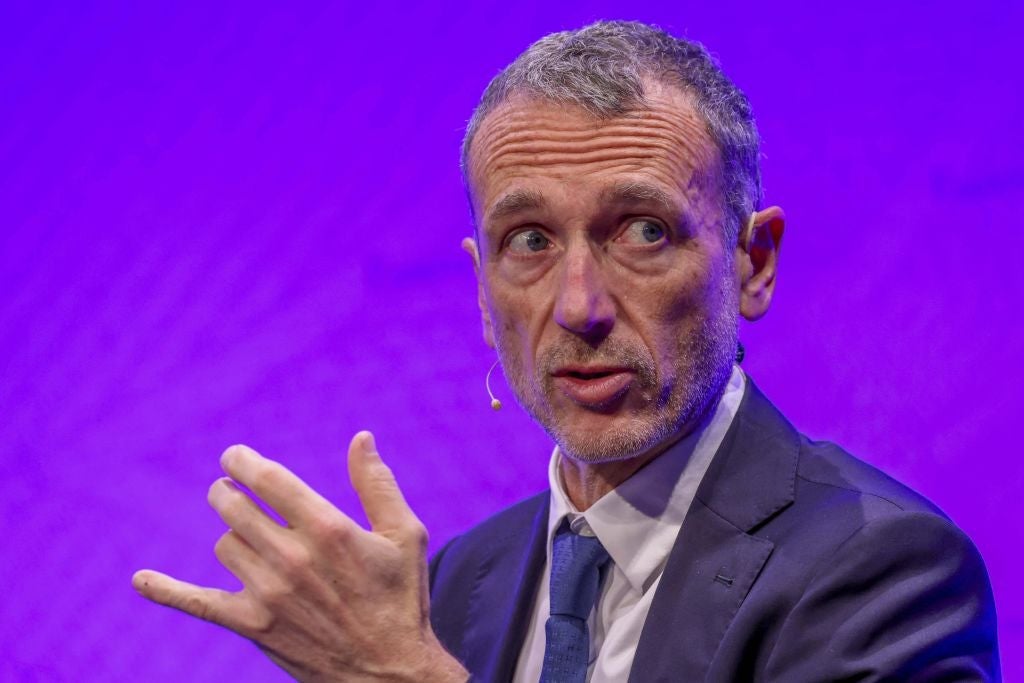
Ever since environmental, social and governance (ESG) became ubiquitous in corporate life, it has faced resistance from all directions. Detractors from the movement such as former BlackRock executive Tariq Fancy called ESG investing a “dangerous placebo that harms the public interest”, while in the US, a fully fledged backlash has emerged in recent months against the mode of investing that incorporates social and environmental considerations into decision-making.
It is in this context that the 2023 CEE Sustainable Finance Summit, organised by the International Sustainable Finance Centre think tank in Prague and attended by RBI sister title Energy Monitor, held an ‘Oxford-style’ debate where participants argued over whether ESG investing is truly a “paradigm shift”, or an “outdated concept that needs to go”.

Access deeper industry intelligence
Experience unmatched clarity with a single platform that combines unique data, AI, and human expertise.
Arguing for the continued relevance of ESG investing was Maxfield Weiss, executive director for Europe of global environmental disclosure platform CDP, and Margarita Pirovska, director of policy at the Principles for Responsible Investment (UN PRI), a global network of investors that in early 2021 had $121trn (€110.7trn) in assets under management.
Weiss kicked off the debate by arguing that the practice of measuring and disclosing ESG risks is already routine, as opposed to something up for debate.
“In a world of increased scrutiny, standardisation and regulation, environmental reporting is now a business norm,” said Weiss, noting that this “paradigm shift” was “pioneered by CDP”, which over the past 20 years has garnered the support of almost 20,000 companies representing half of global market capitalisation, playing a “foundational role developing, mainstreaming and standardising ESG disclosure”.

US Tariffs are shifting - will you react or anticipate?
Don’t let policy changes catch you off guard. Stay proactive with real-time data and expert analysis.
By GlobalDataOne of the main criticisms levelled at ESG investing over the years is that divergent reporting methods and frameworks used by corporates to gather ESG data, along with an ‘alphabet soup’ of voluntary bodies tasked with assessing this data, has led to a lack of consistency, rendering these assessments next to useless.
In response to the demand for comparable data, the IFRS, an international non-profit responsible for developing global accounting and sustainability disclosure standards, established the International Sustainability Standards Board (ISSB) at COP26, with the goal of "fulfil[ling] the growing and urgent demand for streamlining and formalising corporate sustainability disclosures".
Having garnered the support of governments globally, the ISSB published its first set of standards in spring 2022, and following a lengthy consultation process, released a final set of standards on 26 June.
The ISSB’s standards comprise two parts: IFRS S1, which proposes companies disclose information about all their "significant" sustainability-related risks and opportunities, as well as IFRS S2, which focuses only on climate-related risks and opportunities, incorporating the recommendations of the Task Force on Climate-related Financial Disclosures.
Relevant industry bodies from around the world have responded warmly to the ISSB’s release of its inaugural sustainability standards for ESG investing, which will be used by corporates and financial institutions everywhere. For example, Sacha Sadan, director of ESG at the UK’s Financial Conduct Authority, which has been “working closely with the ISSB since the start”, said he was "delighted to see" the launch of standards that aim to “create a common, global language for companies around the world to communicate their sustainability stories in a consistent and comparable way”.
Other groups welcoming the ISSB’s standards, via a press release sent by the ISSB, include the Group of Latin American Accounting Setters, the Financial Reporting Council of Nigeria, the Financial Accounting Standards Foundation of Japan and China's Ministry of Finance.
“There is no pulling back,” said Weiss of the ISSB’s standards during the debate. “ESG reporting underpins the capital markets, [requiring] consistency of information and consistent quality data.” CDP announced in November 2022 that it would incorporate the ISSB’s standards into its own methodology.
Keep up with Energy Monitor: Subscribe to our weekly newsletter
The UN PRI’s Pirovska concurred that there is “no going back” – noting that to reach Paris Agreement goals, "We need to change the whole spectrum of regulation, frameworks, rules of the game – that includes what information market participants give to investors – until two decades ago that was largely financial information."
Pirovska noted that what really matters is the “interoperability” of different regulatory frameworks, which is a word frequently employed by the ISSB to refer to how its standards will align with those simultaneously being developed in specific jurisdictions.
For example, the European Financial Reporting Advisory Group (EFRAG) proposed its European Sustainability Reporting Standards last year, which make up a key provision of the EU Corporate Sustainability Reporting Directive that applies to all “large” EU companies, listed SMEs with revenue of more than €20m and non-EU companies operating in EU markets with a turnover of more than €150m. Across the pond, the US Securities and Exchange Commission is developing its own rules on climate-related disclosures.
ESG investing: are the ISSB’s standards enough?
Achieving interoperability across these divergent standards, each of which are still being developed, is a complex and time-consuming process spanning many years. Given the urgency of climate breakdown, some have questioned the logic of waiting until we have perfect data to act on decarbonisation.
During the CEE Summit debate, Sean Kidney from the Climate Bonds Initiative argued that there is a “terrible risk" that the ISSB discussion "is somehow enough”, noting that while discussions around standard setting are “useful”, we need to focus on “how we get to the future we so urgently need to avoid catastrophe”.
Underscoring the urgency of cutting emissions, rather than focusing on the best methods of calculating them – given the “freight train of climate change coming down the road” – Kidney argued that engaging in lengthy discussions about standards and comparable data “is like shuffling deckchairs on the Titanic”. He echoed Tariq Fancy’s assertion that “the glowing promise of 'ESG integration'" is that it "offers better ways to pick out the more sportsmanlike players" as opposed to delivering real-world impact.
Read more from this author: Polly Bindman
Iancu Daramus, director of climate-aligned investing at Fulcrum Asset Management, said: “We have enough data to act. To some degree, I think the excuse around imperfect data is occasionally used disingenuously."
In a 2021 piece in the Harvard Business Review, Kenneth Pucker, senior lecturer at the Fletcher School at Tufts University and former COO of shoe brand Timberland, made the case that heightened disclosure of ESG metrics by companies can be evidenced as a distraction with little real-world impact by the fact that the increase in the number of companies reporting climate data has not been matched by a decrease in global emissions.
While a crude measure, the failure of global companies to significantly reduce their emissions since the Paris Agreement was agreed in 2015 raises an important question as to the utility of obsessing over ways of reporting on data as opposed to using whatever methods we have to set firm and meaningful targets.
Pucker concludes his article by writing: "Unfortunately, Sustainability Inc.’s [sic] focus on measurement and reporting – and the underlying premise that market-based change would be sufficient – has likely helped to delay these much-needed structural transformations."
The scope 3 conundrum
One area that remains a work in progress for the ISSB, and which causes particular grievance to asset managers when it comes to a lack of data, is scope 3 indirect emissions, which for many businesses account for more than two-thirds of their carbon footprint.
According to an October 2022 report from financial data provider Morningstar, which assessed the responses of a group of major asset managers with a combined $40trn in assets under management to the ISSB’s consultation on its initial standards, scope 3 was a key dividing line, with US asset managers more likely to advocate for limited or deferred requirements for scope 3 emissions.
“Scope 3 [emissions] is a difficult topic," Pirovska tells Energy Monitor in a follow-up interview after the conference. “Many companies say it is too difficult to estimate and they don't have enough data… but at the same time, the [latest] IPCC report has given us a last warning that... we have to start doing something now. And so, figuring out the collective burden of scope 3 emissions throughout the economic value chain is extremely important."
“This is what the EU is doing,” she adds, with EFRAG currently proposing that companies use a combination of methods to apportion responsibility for these emissions, using "primary and secondary data ranging from precise figures (supplier-specific or site-specific methods) to extrapolated figures (average-data or spend-based methods)".
EFRAG is working with the ISSB to incorporate the latter's "building blocks" into its own standards for ESG investing. The ISSB confirmed in October 2022 that it would require scope 3 disclosure and set this out in its draft Climate-related Disclosures Standard.
In a recent interview, ISSB chair Emmanuel Faber said respondents to the ISSB’s initial consultation made clear that while scope 3 reporting is important for investors and bankers, it is "challenging for companies, in particular because of the need to map their overall value chain".
As a result, the ISSB has provided companies with an additional year to include scope 3 information, and is providing them with support and guidance.
The ISSB also agreed to confirm requirements for financed emissions to help banks and asset managers with their own version of scope 3. Currently, a small handful of banks report their financed emissions, although the lack of a standardised approach is leading to discrepancies.
In a June analysis, US-based non-profit the Environmental Defense Fund (EDF) assessed recent scope 3 disclosures from major US banks Citi and JPMorgan Chase. It found that Citi showed "a striking 30% decline in absolute emissions in its oil and gas portfolio from the previous year, but a slight increase in emissions intensity", while JPMorgan Chase "did not disclose absolute carbon emissions from oil and gas but showed a slight uptick in emissions intensity".
These results "are difficult to make sense of", says EDF, as it is unclear how Citi's absolute emissions "could fall so sharply, while its emissions intensity rose". The non-profit also questions how investors can hope to compare Citi’s performance with its peer, which did not report absolute emissions. Acknowledging that disclosure has improved considerably over the past few years, the "bad news", the briefing states, is that climate reporting from banks is "still inconsistent and confusing".
"There is a lot of data out there," sums up Pirovska. "What you want is to make sure that this data is standardised, is comparable, is investment grade. Therefore, you need some standards.” For her, the ISSB’s standards will bring efficiency and clarity to the market “and will make sure that everybody is reporting in the same way on the most baseline data point, which is CO2; emissions”.







